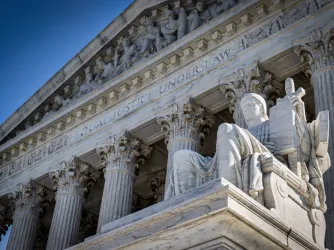Table of Contents
VICTORY: Texas State walks back written warnings handed to RAs

University of College / Shutterstock.com
Texas State University entered 2022 with a new and interesting dilemma. At a time when colleges were fighting tooth-and-nail for students to combat declining enrollment, Texas State found itself with an overabundance of bright-eyed freshmen. With that, came a new problem: Where will all those freshmen live?
Texas State’s housing policy requires any student who graduated from high school within the previous 12 months, as well as any student under 20 who has completed less than 30 credit hours, to live in on-campus housing. The influx of students led to a crunch on available housing for everyone.
Texas State attempted to solve this problem in a variety of ways. Most students were placed in three-person rooms, with overflow moved into hotels near campus. Capacity issues also forced resident assistants to share their rooms with roommates.
At Texas State, RAs perform a multitude of duties in the dorms, including working the phone lines and front desk, walking through the community at night, and supporting their students’ transition to the college environment. Recognizing RAs’ busy schedules, Texas State does not traditionally assign them roommates. Instead, RAs live in a dorm room alone – until this year.
FIRE applauds Texas State’s reinvigorated support for its constitutional duties, and encourages the university to adopt an RA media policy that protects RAs’ First Amendment rights
Enter three RAs for two of the university’s dorms: senior Regina Macias and sophomores Yordanos Kinfe and Ava Melvin. The three RAs spoke with an opinion contributor — and fellow RA — for the campus newspaper, the University Star. In an Oct. 7, 2022, piece, Macias, Kinfe, and Melvin were all quoted discussing their handling of the overfilled dorms, and their opinions on the campus policies that created the issues. Kinfe spoke directly to the impact on RAs, stating: “[W]e also have to be RAs for our roommate, we’re on the clock 24/7.”
And that’s where the trouble began. Texas State’s “Responding to Media Inquiries” policy statement requires employees to “[n]otify their supervisor or the Director of the [Office of Media Relations] or the [assistant vice president] for University Advancement Communications” when responding to media requests. The three RAs, speaking to their fellow RA for the campus newspaper, did not follow that policy. Macias, Kinfe, and Melvin were all summoned to meetings with the residential director of their dorms. At separate, closed-door meetings, the residential director and the assistant director grilled each RA on their knowledge of campus policy statements, and what they should have done when their fellow RA asked them to talk. All three then received letters of warning on their personnel files for their failure to follow policy.
That’s when FIRE stepped in. In a Dec. 28, 2022, letter to the president of Texas State, FIRE reminded the university of its obligations under the First Amendment. Student-employees do not relinquish their rights to expression and speech by virtue of their employment. Under the Supreme Court case Pickering v. Board of Education, employees may speak on matters of public concern in their private capacities, even if the subject touches on their employment. While the RAs are employed to oversee the dorms, they are not forbidden from discussing their workplace conditions or the university’s admissions policies.
On Jan. 13, Texas State backed down. The university removed the written warnings from the files of the student-employees, and affirmed its “support[] of the free exchange of ideas which includes freedom of speech, freedom of inquiry, and freedom of dissent.”
FIRE applauds Texas State’s reinvigorated support for its constitutional duties, and encourages the university to adopt an RA media policy that protects RAs’ First Amendment rights, such as the University of Virginia’s, which reads: “Individual Resident Staff members may speak to the media or public in their individual capacities, making clear they are not speaking on behalf of or for the program.”
This change to campus policy would place Texas State among the growing list of universities that have revised their policies to affirm their student-employees’ expressive rights. FIRE stands ready to assist with this revision.
FIRE defends the rights of students and faculty members — no matter their views — at public and private universities and colleges in the United States. If you are a student or a faculty member facing investigation or punishment for your speech, submit your case to FIRE today. If you’re faculty member at a public college or university, call the Faculty Legal Defense Fund 24-hour hotline at 254-500-FLDF (3533). If you’re a college journalist facing censorship or a media law question, call the Student Press Freedom Initiative 24-hour hotline at 717-734-SPFI (7734).
Recent Articles
Get the latest free speech news and analysis from FIRE.

The federal charges against Don Lemon raise serious concerns for press freedom

The American people fact-checked their government

California prohibits its teachers from talking about a student's gender identity to their parents. That raises First Amendment concerns.



